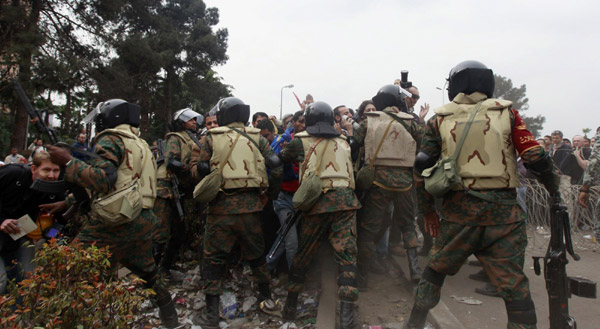Politics
Egypt's ruling party under restructuring
Updated: 2011-02-06 10:12
(Xinhua)
|
 Army soldiers try to contain a huge crowd of opposition demonstrators attempting to enter their stronghold of Tahrir Square in Cairo February 5, 2011. [Photo/Agencies]
|
CAIRO - The top executive committee of Egypt's ruling National Democratic Party including President Hosni Mubarak's son Gamal Mubarak resigned Saturday, the 12th day of Egypt's unrest, which saw fewer protesters in Cairo's downtown Tahrir square.
Hossam Badrawy, who is a prominent physician and politician and has been part of the liberal wing of the NDP, replaced both Safwat el Sherif and Gamal Mubarak as Secretary General and Policy Secretariat of the NDP.
| ||||
Gamal Mubarak was widely believed to have been groomed for the Egypt's presidency after his father, which was strongly opposed by the opposition. Egyptian Vice President Omar Suleiman on Thursday denied Gamal would run for the presidential election late this year.
Mubarak announced on Tuesday that he did not intend to run for next term before he reshuffled the government last week.
The military, which is crucial to decide whether the embattled president will step down, has so far given no hint of its stance.
Earlier on Saturday, Egyptian army commander Hassan al-Roweny went to the Tahrir, or Liberation, Square, in downtown Cairo to persuade thousands of protestors to stop the demonstration and keep the society from being more chaotic.
The senior officer said in a loud speaker that the crowd should go home and the army guaranteed the safety of protestors, a Xinhua reporter said. The address was responded with shouts from demonstrators.
The 12th day of the nationwide anti-government demonstration seemed to be relatively quiet, with few thousands of protestors still sitting in increasingly famous Tahrir Square in downtown Cairo.
For some protestors, the square has become more like home, as they refuse to leave until President Mubarak is gone.
Eye witnesses said that on Saturday night, the Egyptian army in Cairo square prepared to clear the area of the protestors to make space for traffic of working day on Sunday in an attempt to bring back the economic life to Egypt after it was stalled due to massive protests.
President Mubarak on Saturday held a ministerial meeting in his presidential palace, a move to show he is still leading the government amid ongoing pressure for his quit.
The meeting was attended by his economic team, including the prime minister, central bank governor, ministers of petroleum, social solidarity, trade and industry and finance.
Prime Minister Ahmed Shafiq said after the meeting that the situation in Egypt is very reassuring in terms of available basic needs, foodstuffs and fuel.
The government will focus in the coming stage on boosting the internal front, restoring stability and providing the basic needs of the citizens in order to go through this stage peacefully, Shafiq added, stressing his belief that the crisis will be over soon.
However the head of the Egyptian Stock exchange market said it will not reopen on Monday as planned but a new date to resume trading will be decided 48 hours before its opening.
Two main Egyptian opposition parties, namely El Wafd and El Tagammu, which met Egyptian premier to join the dialogue with the new cabinet on Saturday, called upon by Vice President Omar Suleiman.
Almost all the legal political parties have agreed to take part in the dialogue, which was still rejected by the banned Muslim Brotherhood, Egypt's largest opposition group, and the top dissident ElBaradai, who asked for an immediate departure of Mubarak before they accept any dialogue.
"Let's be optimistic," Shafiq said, referring to the continued dialogue despite the numerous political powers and their diverse stances.
Meanwhile a new twist in the US policy towards the Egyptian turmoil, as the US Secretary of State Hillary Clinton praised the restraint shown by Egypt's security forces, but warns of risks with the transition to democracy.
President Mubarak insists that he will remain in his post until his term ends after presidential elections in September. While the US sees that a transition period is crucial, protesters fear that without an immediate exit of Mubarak and the pressure from the streets, the regime will emerge with its authoritarian monopoly largely intact.
E-paper

Ear We Go
China and the world set to embrace the merciful, peaceful year of rabbit
Preview of the coming issue
Carrefour finds the going tough in China
Maid to Order
Specials

Mysteries written in blood
Historical records and Caucasian features of locals suggest link with Roman Empire.

Winning Charm
Coastal Yantai banks on little things that matter to grow

New rules to hit property market
The State Council launched a new round of measures to rein in property prices.




